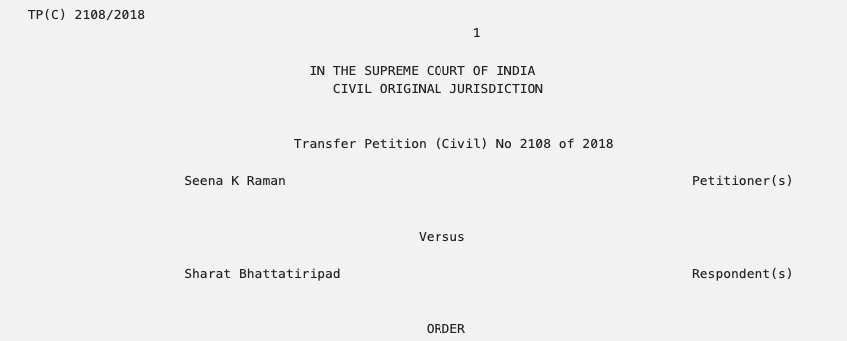In the case of Seena K. Raman vs Sharat Bhattatiripad, decided on February 7, 2020, the Supreme Court of India addressed an important aspect of legal proceedings: the transfer of jurisdiction based on the convenience and circumstances of the parties involved. The petitioner, Seena K. Raman, sought the transfer of a matrimonial suit from Delhi to Bangalore, a request that was granted by the Court.
Background:
The original suit, titled “Sharat Bhattatiripad Vs Seena K Raman” (Suit No.HMA-05/2018), was filed in the Family Court, South-East District, Saket, Delhi. Seena K. Raman, residing in Bangalore and a mother of a seven-year-old daughter, petitioned for the transfer of the case to Bangalore for her convenience.
Legal Proceedings and Decision:
- Hearing of the Case: The Supreme Court, after hearing the counsel for both parties, considered the facts and circumstances of the case.
- Consideration of Convenience: The key factor for the decision was the convenience of Seena K. Raman, especially considering her responsibilities as a mother. The Court acknowledged that prosecuting the matter in Delhi would cause considerable inconvenience to her.
- Transfer of the Case: Consequently, the Court allowed the transfer petition and directed the transfer of the case from the Family Court in Delhi to the Court of Principal Family Judge at Bangalore.
- Directions for Resolution: The Supreme Court further directed the parties to attempt resolving their matrimonial differences through mediation at the Family Court in Bangalore. Additionally, the transferee court was instructed to endeavor for an amicable settlement or an early decision, preferably within six months, while minimizing unnecessary adjournments.
- Order and Proceedings Record: The order was passed by a bench comprising Dr. Justice D.Y. Chandrachud and Ms. Justice Indu Malhotra.
Implications:
This case is significant as it demonstrates the judiciary’s consideration for the personal circumstances of litigants, especially in family court matters. The transfer of jurisdiction in this case underscores the importance of accessibility and convenience in legal proceedings. It also highlights the role of mediation in resolving matrimonial disputes, emphasizing the court’s preference for amicable settlements.
Conclusion:
The decision in Seena K. Raman vs Sharat Bhattatiripad represents a compassionate approach by the Indian judiciary towards managing legal disputes, especially in sensitive cases involving family matters. It sets a precedent for considering the practical difficulties faced by parties in legal proceedings and the potential role of mediation in resolving such disputes.
